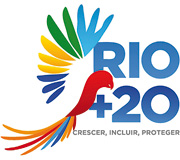Sustainable Development Dialogues 4 – Production & Consumption
17. juni 2012
The economics of sustainable development, including sustainable patterns of production and consumption – Sustainable Development Dialogues 4, Rio+20, 17.06.2012.
 Link til efterfølgende pressekonference.
Link til efterfølgende pressekonference.
Som del af Rio+20-konferencenen afholdes der i dagene 16.-19. juni en meget spændende serie af Sustainable Development Dialogues, som prøver at nå ind til benet af begrebet bæredygtig udvikling.
.
Participants
Mr. Joseph Leahy – Financial Times
Dr. Elisabeth Laville – Director, UTOPIES
Dr. Enase Okonedo – Dean, Lagos Business School
Dr. Gro Harlem Brundtland – Former Prime Minister of Norway
Mr. Helio Mattar – President, Akatu Institute. Co-founder of the Ethos Institute
Dr. Ignacy Sachs – Professor, Centre de Recherche sur le Brésil Contemporain
Mr. Juan Carlos Castilla-Rubio – CEO, Planetary Skin Institute
Dr. Kelly Rigg – Executive-Director, Global Campaign for Climate Action
Dr. Mathis Wackernagel – Co-Founder, Executive-Director, Global Footprint Network
Dr. Thomas Heller – Executive-Director, Climate Policy Initiative
Ambassador Rubens Ricupero – Former Secretary-General, UNCTAD
.
Top 10 Recommendations
For hver af de 10 dialoger er der forud opstillet 10 anbefalinger, hvor dialogerne har til formål at indskrænke antallet til tre. Den ene anbefaling fastlægges ved online afstemning med inddragelse af de virtuelle deltagere (typisk mere end 1 mio. afgivne stemmer), den anden fastlægges af panelet ved dialogernes afslutning, den tredje afgøres ligeledes ved afstemning fra salen.
De 10 anbefalinger er:
◊ Promote Sustainable Public Procurement worldwide as a catalyst for sustainable patterns.
◊ Promote principles for a green and fair economy.
◊ Use health related indexes to measure progress towards sustainable development.
◊ Hold an international conference on global governance in 2013.
◊ Put a price-tag on natural resources, so that they are not economically invisible.
◊ Include enviromental damages in the Gross National Product (GNP) and complement it with measures of social development.
◊ Phase out harmful subsidies and develop green tax schemes.
◊ Convene an United Nations commission to define Key Performance Indicators on natural capital that could be integrated into Gross Domestic Product accounting.
◊ Promote a holistic approach to sustainable development, taking into account environmental, economic, political and social aspects.
◊ Adopt carbon standards and use renewable resources as a means to stimulate and strengthen local economies.
.
Final recommendations
◊ Phase out harmful subsidies and develop green tax schemes.
◊ Include environmental damages in the Gross National Product (GNP) and complement it with measures of social development.
◊ Promote sustainable public procurement worldwide as a catalyst for sustainable patterns, taking into account the need for a holistic approach to sustainable development and principles for a sustainable and fair economy.
.
De 10 Sustainable Development Dialogues
De i alt ti dialoger er en enestående mulighed for at høre begavede mennesker fra hele verden reflektere over bæredygtig udvikling – hvad det indebærer, og hvordan den kan implementeres. Men FNs webcast-system er ganske omfattende, så jeg har lagt den engelske udgave af de ti Sustainable Development Dialogues ind på bloggen her:
1) Sustainable development as an answer to the economic and financial crises.
2) Unemployment, decent work and migrations.
3) Sustainable development for fighting poverty.
4) The economics of SD, including sustainable patterns of production and consumption.
5) Forests.
6) Food and nutrition security.
7) Sustainable energy for all.
8) Water.
9) Sustainable cities and innovation.
10) Oceans.
Se samtlige ti indlæg med Sustainable Development Dialogues.
Se øvrige blog-indlæg om Rio+20.

